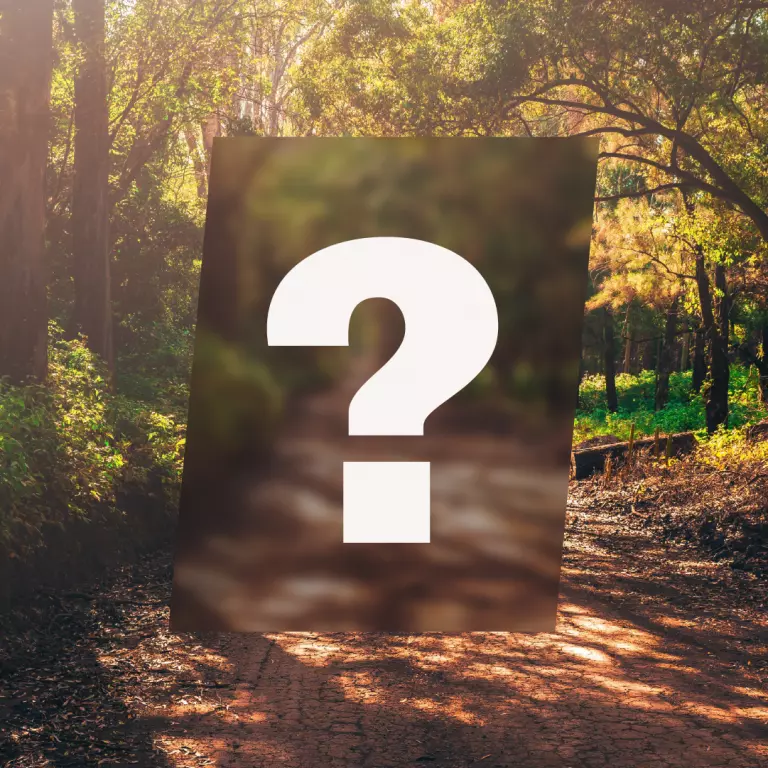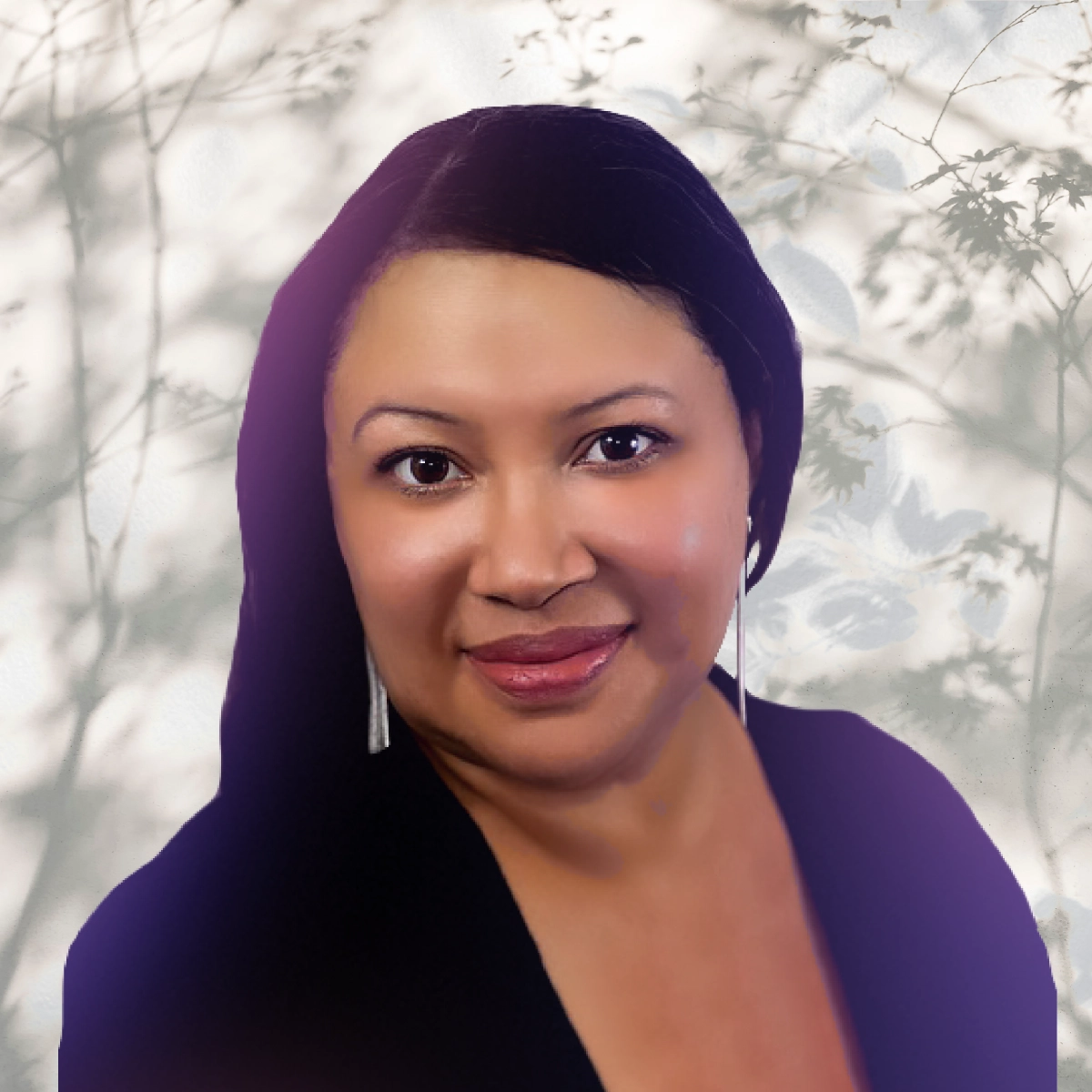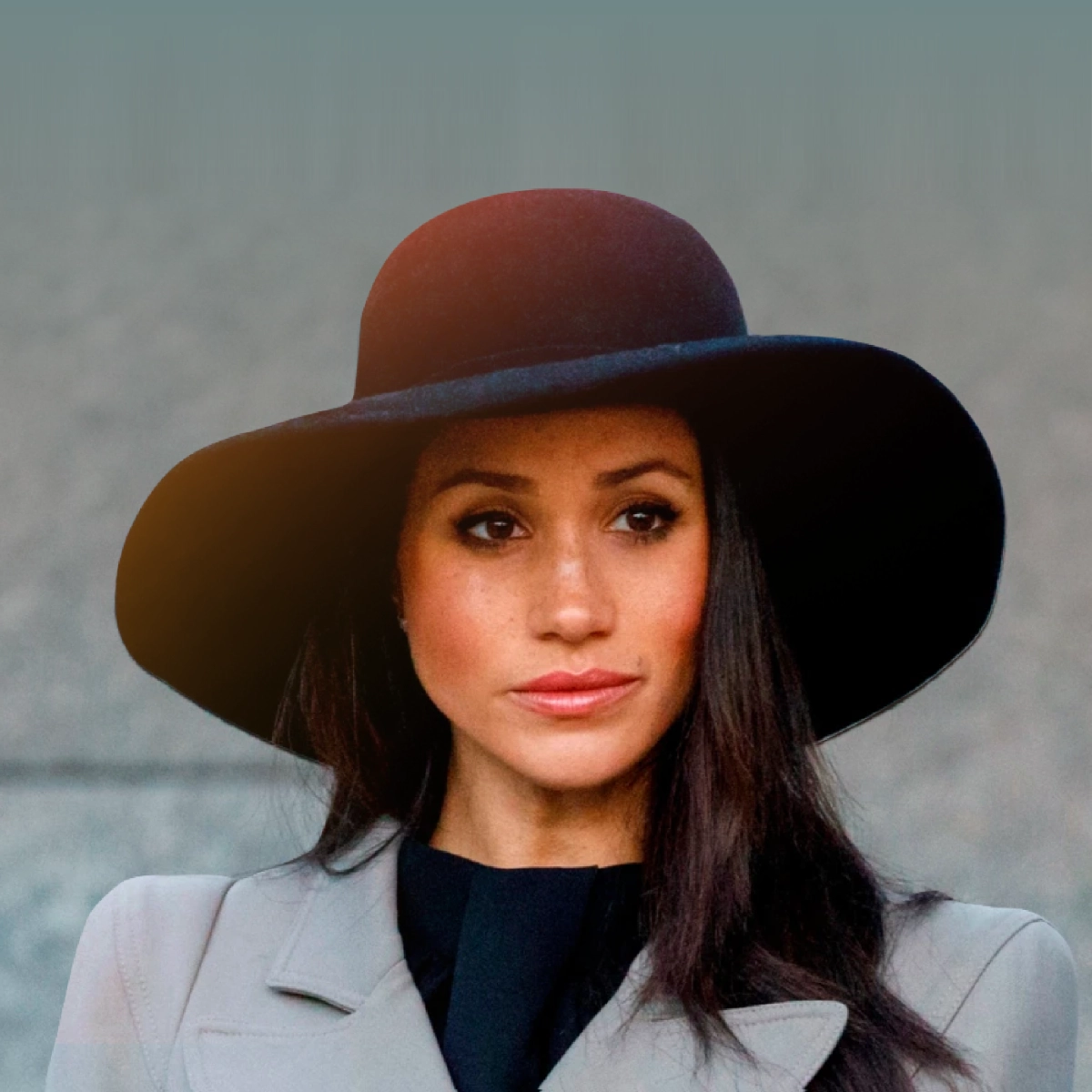November is the time for celebrating National Native American Heritage month. At The Mixed Space’s November Meetup, we came together to connect and to highlight what life looks like at the intersections of society. It was especially a time to reflect upon how we can incorporate Native traditions, given climate change and widespread pollution.
Ariel mentioned how the Intergovernmental Panel on Climate Change released an updated report on August 9th, indicating that our future plans for life must include continued natural catastrophes and water insecurities. In light of this report and the month’s celebrations, she asked these important questions: What is sustainability in 2021? And who can we turn to as we shift our relationship to the Earth? For her, it was clear that “There can be no climate justice without Indigenous leadership. Period.”
The Mixed Space’s founder, Lili, then began with a moment of silence in honor not only for the missing, murdered, and silenced Indigenous women across the US and Canada, but also for the connection with the earth and nature that we all share.
Our two speakers for this evening were Darvette Lefthand and Carla Marie Munoz. Carla is a tribal councilwoman and liaison for the Costanoan Rumsen Carmel Tribe. She’s from the Bay Area and works very hard to create space for ceremonies, land restorations, and tribal recognition for her community. Darvette is an Indigenous activist, a model, and member of the Stoney Nakoda Sioux Nation. She’s from Morley, a first nation settlement in Alberta, Canada and she’s determined to make her reservation safer through her work with a grassroots movement dedicated to eradicating drugs from the Stoney Nakoda Reserve.
This month’s donations were dedicated to the Ohlone Youth Summit, a charity that Carla is affiliated with, which is dedicated to restoring traditional knowledge and bringing tangible culture to the summits to tribal youth. Check out one of their past Youth Summits here.
Carla kicked off the conversation by talking about her background as a tribal councilwoman of the Costanoan Rumsen Carmel Tribe, which is primarily based in the Central Coast area of California. Though around 2000 members relocated to Southern California some hundred of miles away. She grew up in an Indigenous community that wasn’t given their own reservation nor were federally recognized, but they cultivated ceremonial life with state recognition. She describes how she has to liaison with government officials to be allowed to have ceremonies on federally owned land such as national parks and land trusts, which used to belong to her tribe.
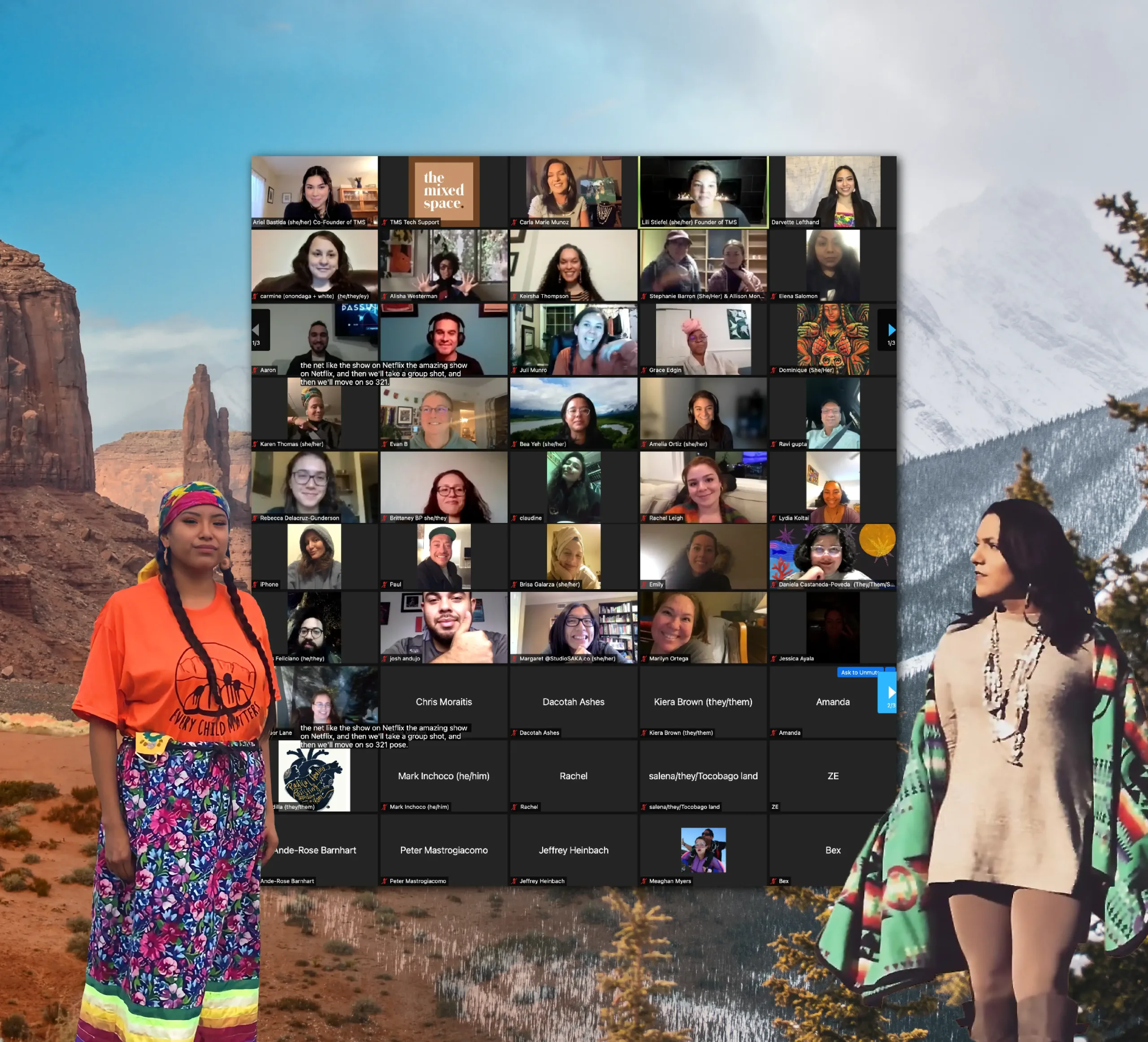
Darvette then shared her experiences living on a reservation in Canada. Her tribe, the Nakoda (also known as Stoney or Îyârhe Nakoda), currently inhabit much of what is now Alberta, Saskatchewan, and Montana, even though they are related linguistically to the Lakota and Dakota of the Great Plains and the Rocky Mountains. The Stoney Nakoda and the Cree traveled from the US all the way through the Rocky Mountains and Canada to settle in areas that neither tribe selected for themselves. “[We] were forcefully having to move here,” she says. “And we’ve kind of been here ever since.”
Once Darvette and Carla shared these historical contexts and their personal backgrounds, the overarching question of how to resist oppression, both systemic or actual in forms of cultural genocide. Carla spoke about how she subverts government restrictions on gathering natural materials and creating bonfires for ceremonial purposes; she also referenced several cultural genocides from the Mission period to the current overuse and abuse of plastics and how that has affected the environment and Indigenous culture. Darvette also brought to mind the Native lives lost during the various migrations from their ancestral homelands to reservations.
By bringing up how governments have acted against Indigenous populations, Carla’s view is that “these laws that have been in place in order to make us lawbreakers, so they want us to go and trespass into spaces.” Again, these institutions exercise control, not just on Indigenous territories, but also Indigenous ways of life.
During the Q&A, community member Sandra, an Indian educator of 45 years, made a few interesting points on how to approach conflict between Native views and state/federal bureaucracy. She says that “And we have to remember, and all of us, when we’re dealing with all this bureaucracy, we shouldn’t go into it as a battle. We should go into it as we’re teaching.” This teaching extends into technical matters as well such as the Indigenous practice of controlled burns, which has only been recently adopted by state fire departments. After speaking on the late Floyd Westerman’s view that trees and humans share a large percentage of DNA and are as a result related, Sandra shares that issues that she has protested for during the Longest Walk in 1978 are continued to be fought for. “’Cause [we can’t] just keep looking at the negative,” Sandra says. “Or we’ll get overwhelmed.”
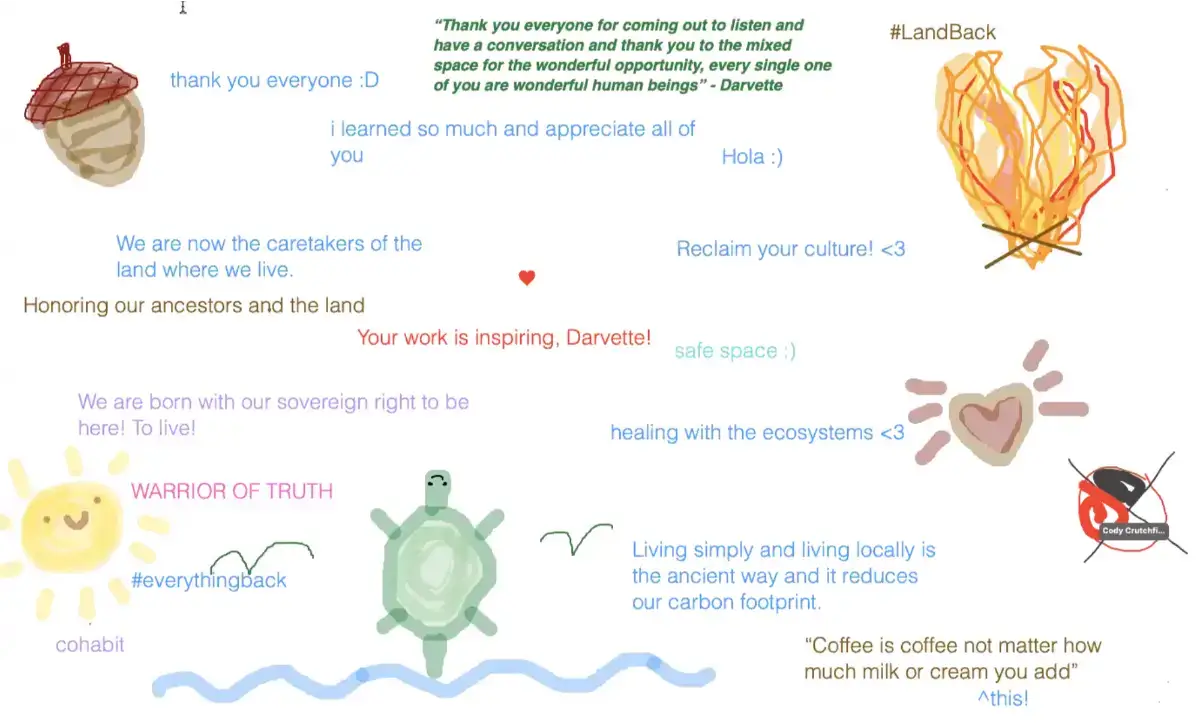
The conversation closed on topics of support for addiction on reservations and the idea of support between tribal nations. Darvette describes how her community receives much support against addiction from neighboring reservations and cities. An organization called the Sober Group, which is a part of their nation, helps out in their mission. The critical difference, however, is that their initiatives do not receive support from their chief council system. This conflict between the members and the leadership are at odds, but the drive to continue their grassroots movement goes on.
Later, Carla gives an example of what a nation-to-nation support system would look like in reality. The Apache Stronghold nation is fighting to retain their sacred lands from the government’s proposed mining projects; in response, they embarked on a spiritual convoy from their lands in Arizona through Southern California to Northern California, where Carla participated and hosted them in her home. She says, “And it just really reminded me of times that we would have had as Indigenous communities in the past where if one community was struggling, they would reach out to other indigenous communities and we would host them in a good manner and there would be trade and festivals involved.” The shared food between the various communities was the acorn, which for Carla, was both a literal and metaphorical reminder of their mutual bonds.
After everyone drew and wrote their feelings on the evening’s Community Whiteboard, Lili thanked the evening’s speakers for their insights: “I just also wanna say thank you so much Darvette and Carla, for all of your gems that you’ve shared tonight with us and for the wisdom and the insight and the leadership and the vulnerability that you have brought to this meetup here today. It means a lot to me. And I look up to both of you and I really appreciate it that I’ve been able to share space with you today.”
thank you everyone 😀
“Thank you everyone for coming out to listen and
have a conversation and thank you to the mixed
space for the wonderful opportunity, every single one
of you are wonderful human beings” – Darvette
i learned so much and appreciate all of you
Hola 🙂
#LandBack
We are now the caretakers of the land where we live.
Honoring our ancestors and the land
Reclaim your culture!
<3 Your work is inspiring, Darvette!
safe space 🙂
We are born with our sovereign right to be here! To live!
healing with the ecosystems <3
WARRIOR OF TRUTH
#everythingback
Living simply and living locally is the ancient way and it reduces our carbon footprint.
cohabit
“Coffee is coffee no matter how
much milk or cream you add”
^this!
Chat Recap
The November Meetup was a fantastic opportunity for listening and learning. Here are all the resources we shared listed below:
The Mixed Space YouTube Channel
The Mixed Space Instagram Page
The Thanksgiving Address is a Haudenosaunee land acknowledgement
Battle Against Drugs Walk reaches local community
Haldimand Tract Moratorium: Protect the Tract
The U.S. Constitution and the Great Law of Peace
Gathering of Good Minds (2020, documentary)
Native American Hand Talkers Fight to Keep Sign Language Alive
American Sign Language & Plains Indian Sign Language (PISL)
“Talking Without Words in the Old West” (2009)
Online Intergroup of Alcoholics Anonymous
Ohlone Youth Summit: Building a Tule Boat
Memorandum on Tribal Consultation and Strengthening Nation-to-Nation Relationships | The White House
Two Row Wampum Renewal Campaign
December Meetup | Religiously Mixed
Chief Quiet Thunder of the Lenni Lenape Indians of New Jersey
Community IG Handles and Emails
@StudioSAKA.co
@adventures_of_julitacos
@vandalistos
@adventureseeker02
@allisonfmonroe
@jayiztrsh1
@yolotlholistic
@jayala19
@brooklynwarmi
@keirshas_tea
@themixedspace
@_arielbastida_
@perfect_pixel_ny
@culturalfire
@queernature
@darvette_
@Nativebeautyspirit
@Carlamariejewlry
@Ohlonesisters
@AventureraDani
@lilistiefel
@Natives4Nature
FriendsofLenapeEverywhere@gmail.com


